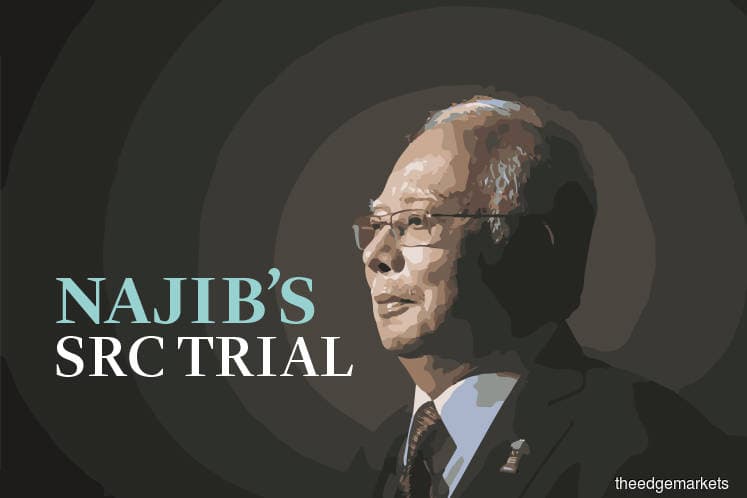
This article first appeared in The Edge Malaysia Weekly on August 5, 2019 - August 11, 2019
FORMER AmBank relationship manager Joanna Yu Ging Ping replies last week during cross examination raises questions over the extent of Bank Negara’s knowledge of the humongous foreign remittances facilitated by fugitive financier Low Taek Jho, or Jho Low, into the accounts of Datuk Seri Najib Razak.
They include the US$680.99 million (about RM2.6 billion at the time) that was transferred into the former prime minister’s account ending 694 in several tranches in 2013, represented by Low then as a “gift” or “donation” from Saudi royalty and for which relevant “supporting letters” had been provided.
As the bulk (US$620 million) was unutilised, it was subsequently returned to the transferor. Prior to that, the central bank had advised AmBank to purchase US dollars in tranches so as not to disrupt the market.
Although the RM2.6 billion transfer was brought up in Najib’s SRC trial last week, those funds have nothing to do with the seven charges involving RM42 million of SRC money.
The RM2.6 billion relates to the upcoming 1Malaysia Development Bhd trial — slated to begin this month — in which Najib faces 25 corruption and money laundering charges.
At the time, the supporting letters were taken by then AmBank group managing director Cheah Tek Kuang to then Bank Negara governor Tan Sri Zeti Akhtar Aziz.
In an interview with Malaysiakini on July 2 last year, Najib maintained that Zeti was aware of the huge amount that had been remitted into his personal bank account in 2013 before the 13th general election and had not raised any concerns.
However, Zeti took umbrage at Najib’s contention and issued a statement refuting his claim the next day. She revealed that on July 3, 2015, she had been summoned to meet Najib, who requested that she issue a statement to say he had done nothing wrong in his account.
“I informed him that I could not issue such a statement because I did not have knowledge of the transactions that had occurred in his account,” Zeti then wrote, adding she also rejected a similar request from a Cabinet minister.
“On the matter relating to transactions by account holders in the banking system, Bank Negara relies on information provided by the reporting financial institution ... Unless the relevant banking institution reports to Bank Negara of irregularities in an account or if Bank Negara received a tip-off that gives [it] a reason to believe that an offence has occurred, the central bank is not able to initiate investigation into the account,” she added.
Yu, in responding to a question by Najib’s counsel Harvinderjit Singh, agreed there was no effort on her part to hide any of the transactions from the authorities.
“There was nothing to hide. The relevant departments [in AmBank] that handled the conversions, they all knew about the transactions as well,” she told the court.
Subsequently, the unutilised portion of the “donation” was returned. To facilitate the return of the US$620 million, AmBank’s foreign exchange department had to repurchase US dollars, as the initial amount received had already been converted into ringgit. The US dollars were then pooled into a suspense account before it was returned to the transferor.
Given the significant sum involved, Bank Negara had to be informed. The central bank suggested that AmBank purchase the greenback in tranches so as to not move the market, prior to the US$620 million being returned in one lump sum, Yu said. But she conceded that handling the return of the vast sum had been stressful.
The other transactions that the central bank purportedly knew about were the British pounds that were transferred into Najib’s account ending 880 in 2014, which included remittances of £5.75 million and £2 million.
Both transactions were marked as “gift” in the supporting documents provided. The transactions did not ring any alarms.
In BlackBerry Messenger chat logs between Yu and Low, the latter had asked the former to get Cheah to “talk to the governor” and pass the supporting letters for the transactions.
In the event that questions were raised by the central bank’s foreign exchange department regarding the transactions, Low told Yu to tell them that the governor was aware of the transactions.
While Bank Negara may have been aware of some of these fund transfers, Low had also tried to stay off the central bank’s radar in other transactions, including a transaction in July 2014, whereby he had asked Yu about US dollar transfers, specifically on whether Bank Negara’s approval was required for transfers below RM50 million.
He then asked if it was possible to transfer RM100 million via two tranches of RM50 million each through two separate companies to bypass the requirement for the central bank’s approval. However, he eventually opted to go with a local RENTAS transfer, which only required some form of supporting documents.
Save by subscribing to us for your print and/or digital copy.
P/S: The Edge is also available on Apple's AppStore and Androids' Google Play.